Customer Services
Copyright © 2025 Desertcart Holdings Limited


The Midnight Library: A GMA Book Club Pick: A Novel (The Midnight World) [Haig, Matt] on desertcart.com. *FREE* shipping on qualifying offers. The Midnight Library: A GMA Book Club Pick: A Novel (The Midnight World) Review: Everything we do can change the course of our lives. - At first this was sad, but by the end of the first chapter, it hooked me when after she tries to kill herself she discovers, "There's another place to go, and it's not some mythical after life." What if a lot of books, endless books of us, existed on our just making one different choice and it changed everything. What if we crossed a street at a certain time and met the love of your life, but what if you ignored him that day. It's all in here... What if we followed through on our childhood dream but realized it was only to get a parents approval, and you found out, it didn't make a difference anyway because other people aren't controlled by us and their lives and issues would have existed anyway... What if we followed any of the dreams we had of becoming, when we grew up, as a child, if we knew ahead of time what the outcome would be, would we choose another ending, or would we hold on to the life we have because every day we can decide to change just one thing and have a totally different life outcome than the one we have now. This was inspiring, and life changing in how it really made me rethink what I thought I knew.. What if we had made one simple change in our current life and we began to see we matter. Every person we touch, every word we say, every kind thing we do for others all does matter, and may have changed their lives, or saved them. Every day is precious and matters because we're here. In the end, as long as you have any time left, you can still make dreams come true and make it the life you want, or change someone else's life. Life affirming, and deep, this book will make you think, and see your existence matters more than you imagined, because of the lives you touched and may still touch yet. A great read, and a deep dive into our own "what if"..then read it again. I promise you'll think about this book for a very long time after you read it. BTW, it has a great unexpected ending. Review: Thought provoking story. - "The Midnight Library" is one of those books that really "hit home" the older I get and the more regrets I have. What if there was a way to undo your regrets? What would your life look like? This story follows a MFC named Nora who gets the opportunity to see how her life could be if she had made different choices. Matt Haig is a talented author that brings out deep emotions in his readers. If you have ever read any of his other books, "The Midnight Library" has the same kind of emotional depth as his other works. I ordered the hardcover and it was delivered in perfect condition. No bent or dented edges, which seems to be rare from desertcart book deliveries in my personal experience. It is a fairly quick read being only 288 pages. For a book that is not my genre of choice, I found it to be a pretty nice read.




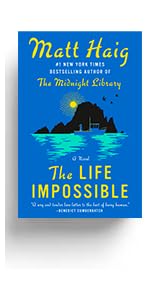
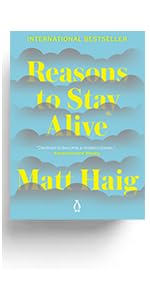
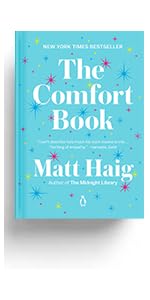

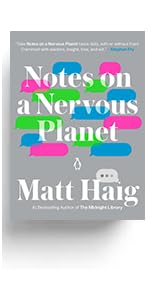
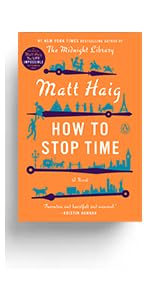
| Best Sellers Rank | #197 in Books ( See Top 100 in Books ) #1 in Time Travel Fiction #2 in Science Fiction Crime & Mystery #13 in Literary Fiction (Books) |
| Customer Reviews | 4.4 4.4 out of 5 stars (280,297) |
| Dimensions | 5.06 x 0.79 x 7.75 inches |
| ISBN-10 | 0525559493 |
| ISBN-13 | 978-0525559498 |
| Item Weight | 2.31 pounds |
| Language | English |
| Part of series | The Midnight World |
| Print length | 304 pages |
| Publication date | May 9, 2023 |
| Publisher | Penguin Books |
L**.
Everything we do can change the course of our lives.
At first this was sad, but by the end of the first chapter, it hooked me when after she tries to kill herself she discovers, "There's another place to go, and it's not some mythical after life." What if a lot of books, endless books of us, existed on our just making one different choice and it changed everything. What if we crossed a street at a certain time and met the love of your life, but what if you ignored him that day. It's all in here... What if we followed through on our childhood dream but realized it was only to get a parents approval, and you found out, it didn't make a difference anyway because other people aren't controlled by us and their lives and issues would have existed anyway... What if we followed any of the dreams we had of becoming, when we grew up, as a child, if we knew ahead of time what the outcome would be, would we choose another ending, or would we hold on to the life we have because every day we can decide to change just one thing and have a totally different life outcome than the one we have now. This was inspiring, and life changing in how it really made me rethink what I thought I knew.. What if we had made one simple change in our current life and we began to see we matter. Every person we touch, every word we say, every kind thing we do for others all does matter, and may have changed their lives, or saved them. Every day is precious and matters because we're here. In the end, as long as you have any time left, you can still make dreams come true and make it the life you want, or change someone else's life. Life affirming, and deep, this book will make you think, and see your existence matters more than you imagined, because of the lives you touched and may still touch yet. A great read, and a deep dive into our own "what if"..then read it again. I promise you'll think about this book for a very long time after you read it. BTW, it has a great unexpected ending.
J**A
Thought provoking story.
"The Midnight Library" is one of those books that really "hit home" the older I get and the more regrets I have. What if there was a way to undo your regrets? What would your life look like? This story follows a MFC named Nora who gets the opportunity to see how her life could be if she had made different choices. Matt Haig is a talented author that brings out deep emotions in his readers. If you have ever read any of his other books, "The Midnight Library" has the same kind of emotional depth as his other works. I ordered the hardcover and it was delivered in perfect condition. No bent or dented edges, which seems to be rare from amazon book deliveries in my personal experience. It is a fairly quick read being only 288 pages. For a book that is not my genre of choice, I found it to be a pretty nice read.
F**S
Excellent read!
Great read to start off the new year! Gives perspective about life choices, possible regrets, and living in the contentment of the here and now.
P**Y
Great premise but not executed well
📚✨ BOOK REVIEW ✨📚 The Midnight Library by Matt Haig ⭐️⭐️⭐️ What if every regret you’ve ever had could be undone? The Midnight Library follows Nora Seed, who finds herself in a magical library where each book contains a life she could have lived. She gets the chance to “try on” these lives one by one, hoping to find the one where she truly belongs. It’s a story about choices, second chances, and the quiet beauty of simply existing. I really loved the message behind the story, but the book didn’t completely land for me. The premise is incredible—a library where you can step into the lives you never lived—and there were moments that genuinely made me stop and reflect. Matt Haig has a way of writing lines that feel like they’re meant for anyone who’s ever felt stuck or overwhelmed. But overall, the story felt a little repetitive at times, the pacing dragged in places, and I didn’t always feel fully connected to Nora or the alternate lives she tried on. I found myself wishing we could linger in some of those worlds instead of bouncing through them so quickly. For me, it’s one of those books where I appreciated the idea more than the execution. The message about embracing the life you have is powerful, yet the story leaned a bit too heavily on philosophy over plot. That said, there are several meaningful quotes and gentle reminders about regret, choice, and finding your way back to yourself. I can absolutely see why this book resonates so deeply with so many readers—it just wasn’t a full hit for me.
K**Y
Thoughtful, comforting, and quietly powerful
Matt Haig has a rare ability to explore heavy, existential themes with warmth, hope, and humanity, and The Midnight Library is a beautiful example of that balance. This novel asks big questions about regret, choice, and the lives we imagine might have been, while remaining deeply personal and emotionally accessible. Nora Seed’s journey through the library of infinite possibilities is both imaginative and painfully relatable. Each life she steps into reflects the quiet “what ifs” that so many of us carry — the roads not taken, the versions of ourselves we mourn without fully realizing it. Haig’s writing never feels judgmental; instead, it offers compassion, reminding the reader that meaning isn’t found in perfection, but in presence. What stood out most to me was how gently this book handles mental health and despair. Rather than offering easy answers, it acknowledges the weight of existing while still leaving the reader with a sense of hope. It’s reflective without being heavy-handed, philosophical without losing its emotional core. The Midnight Library is the kind of book that lingers — not because it tells you how to live, but because it makes you pause and consider the life you already have. Thoughtful, comforting, and quietly powerful.
A**R
Livro extraordinário e de uma imaginação incrível! Um excelente presente para de Natal ou de aniversário para alguém inteligente Recomendo!
C**D
I find myself lately reading what I think are very good books. From the pleasant to the thought provoking to the fun to the serious and enlightening to the masterful to the beautiful to the despairing and tragic. This I tell you is a read that yet again I cannot properly articulate into language on the fundamental essence of its themes and context. To put simply, it is quite something that I totally did not expect in many ways, although I expected in some. But as I read and discovered, it is truly remarkable. So here is what I will write with my utmost ability in describing something so accessibly written and simply said, yet so profound and significant. What comes to mind when I recall back as I turned from page to page is a question - “What Does It Mean To Be Human?”. It is apparent to me that I am yet again, reminded that what seems to be the things we want aren’t necessarily so and the things we truly need or want have been many a times right in front of us I suppose. When I look up at the stars at night, I am acutely aware how insignificant and meaningless we all are individually. How abysmal most of our efforts are in trying to live up to Human made concepts of what is considered to be an appropriate life and how one should behave. What I have learned from this is that there is no appropriate way, there is of course being a decent human being and how we can treat each other better. But there is NO absolute way of living. There is just living and figuring it out as we go along. The Midnight Library would definitely be one of my cherished books for this time around, as it solicits perspectives, drives hard the extremes of what is possible, and forces one to contemplate infinity and the singularity of all things. For some reason, I feel hope because I feel I have a better understanding of what being present in your current situation entails. This perhaps is cliche and cringy to say, but it’s the truth. I believe we all know this, but we tend to need reminders every now and then. After all, our perfection as individuals and on the whole; Humanity, is that our perfection lies within the imperfections, the Chaos of Life. I conclude my personal review with this; with another idea or perhaps a stipulation: everyone has their own direction of life and their own codes of philosophy to live by, yet the as we slowly step towards the vast and endless unknown, it is the potential of the indeterminate future that allows us to discover new things, try different things, and grow and break and grow and break again. I believe that is what we call progress. If you cannot tell from my bias, this book is definitely worth the time to read and consider and contemplate. I am in a situation right now where I am hesitant on certain moves and of future prospects, but this has provided some much needed clarity. Not bad Haig. You indeed did your job.
P**A
Eu simplesmente amei o livro!!! O inglês é bem fácil de ser compreendido e a história é bem fluída. Eu gostei da personagem principal e também em vários momentos me vi no lugar dela. Chorei em algumas partes porquê o autor consegue transmitir os medos dela de maneira que chega a doer, o que tornou a experiência de leitura muito única. Foi meu primeiro livro deste autor e espero ler outros.
M**A
Amazon is the best platform for online shopping for the following reasons: Fastest delivery! Literature options beyond SA border! Easiest payment options! Would love to see more exposure on International brands.
D**O
Great book. Bought the hardcover edition. The dust jacket is plastic-like but not glossy. The paper is good.
Trustpilot
1 month ago
3 days ago